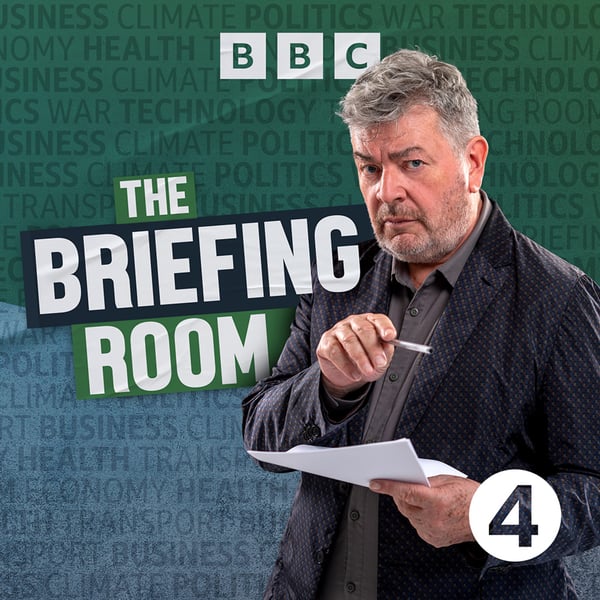Health 1: Advances in cancer research and treatment
The Briefing Room
BBC
4.8 • 731 Ratings
🗓️ 11 July 2024
⏱️ 36 minutes
🧾️ Download transcript
Summary
Half the UK population will get cancer during their lifetime - and rates are rising. Each year, around 385,000 people in the UK are diagnosed and around 167,00 lives are lost to the disease. But scientists are developing new therapies, including personalised vaccines and targeted drugs, that attack cancer cells directly and more effectively. It's hoped this pioneering work could lead to better survival rates. David Aaronovitch and guests discuss promising developments in cancer care - to find out how significant they might be.
Guests: Professor Charles Swanton, chief clinician at Cancer Research UK and deputy clinical director at the Francis Crick Institute; Dr Olivia Rossanese, Director of the Centre for Cancer Drug Discovery at the Institute of Cancer Research; Christian Ottensmeier, Professor of Immuno-Oncology at the University of Liverpool; Professor Alan Melcher, Consultant Clinical Oncologist at The Royal Marsden NHS Foundation Trust
Presenter: David Aaronovitch Producers: Rosamund Jones and Sally Abrahams Sound engineers: Rod Farquhar and Neil Churchill Editor: Richard Vadon
Transcript
Click on a timestamp to play from that location
| 0:00.0 | BBC Sounds, Music, Radio, podcasts. |
| 0:08.7 | I'm David Rolovich. Welcome to the briefing room where every week in half an hour with the help of top experts, we try as best we can to understand a big issue. |
| 0:18.0 | This is the first of three special podcasts which all focus on the same theme, |
| 0:23.0 | the future of health. In the next episode, we're asking why there appears to be an epidemic |
| 0:28.1 | of anxiety and depression. And the third in the series has another question, to what extent |
| 0:33.5 | might artificial intelligence revolutionise medicine? But in this one, we're focusing on cancer |
| 0:39.7 | and asking whether we're experiencing a step change in our understanding and treatment of the disease. |
| 0:51.6 | To begin with, though, I want to understand more about how much cancer there is, whether that's been changing, and what our chances are of surviving it. |
| 1:01.0 | Professor Charles Swanton is chief clinician at Cancer Research UK and deputy clinical director at the Francis Crick Institute. |
| 1:08.8 | Charles Swanton, the simplest of all questions first, what is cancer? |
| 1:12.7 | Cancer is an uncontrolled proliferation, deriving from a single cell that can ultimately grow into a mass |
| 1:20.8 | in a particular tissue or human organ and spread around the body and cause death either due to the burden of disease across multiple |
| 1:29.6 | tissues in the body in a process called metastasis or cause other secondary effects like |
| 1:35.5 | blood clots, cancer pain, fatigue, loss of weight, etc. |
| 1:40.3 | Right. Can you tell us now whether more of us are getting cancers than used to in the past? Do we know that? |
| 1:45.6 | Yes, we do know that. There has been an increase in the number of cancer cases per year. And in part, that's due to an aging population and a reflection, I think, of our successes in other fields of medicine, such as cardiovascular disease. So people are living longer. Obviously, there are more people on the planet. |
| 2:02.5 | And as a result of that combined effect, you have a situation where we're seeing more cancers. |
| 2:07.5 | Is it the case that as you get older, you are more prone to getting a cancer? |
| 2:11.7 | Yes, that's absolutely right. After the age of about 50, we see a very steep increase in cancer risk and incidents. |
| 2:19.4 | And is this a worldwide phenomenon? |
| 2:20.7 | Yes, it is a worldwide phenomenon, yeah. |
| 2:22.7 | Are we also seeing an increase in the numbers of younger people who get cancer? |
... |
Please login to see the full transcript.
Disclaimer: The podcast and artwork embedded on this page are from BBC, and are the property of its owner and not affiliated with or endorsed by Tapesearch.
Generated transcripts are the property of BBC and are distributed freely under the Fair Use doctrine. Transcripts generated by Tapesearch are not guaranteed to be accurate.
Copyright © Tapesearch 2025.

